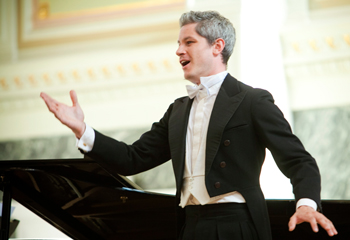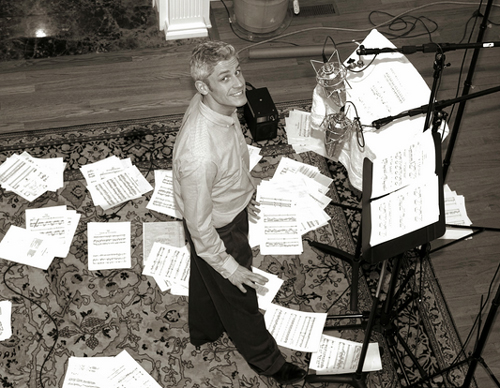by Daniel Hathaway

Crossley-Mercer was “discovered” by Art Song Festival artistic director George Vassos through YouTube videos. The baritone spoke with us three years ago for a pre-concert interview while preparing to sing the role of Don Giovanni in Dijon. We reached him by Skype at his home in France’s Auvergne region to catch up on his recent activities and talk about his Tuesday recital.
Daniel Hathaway: You always have a wide and interesting range of operatic roles in your calendar. What characters have you sung recently?
Edwin Crossley-Mercer: I’ve sung Papageno in Magic Flute, Leporello in Figaro, Lescaut in Manon, the Count in Figaro, Eurymaque in Pénélope, Brander in La Damnation de Faust, Harlequin in Ariadne — plenty, plenty, plenty. I also made my Japanese debut at the Seiji Ozawa Festival in Matsumoto, near Nagano, in the middle of the spectacular Japanese “Alps.” I really enjoyed the Japanese culture. Their modern art collections are so smart and fantastic.
DH: On Tuesday, you’ll turn from opera to explore art song. What will you be singing?
EC-M: We’ve put together a program of nocturnes — nightmares, love-song serenades, songs about moonlight, and a broad spectrum of poetic songs on the theme of night. The first half will be devoted to Robert Schumann’s Dichterliebe, and Jason will play some solo pieces by Liszt and Debussy. The second half ranges from Schubert to Liszt, Debussy, and Strauss. We’ll also be premiering a song by Michael Linton on a text by Oscar Wilde — Jason and I recently made a recording of Linton’s Carmina Catulli, songs on poetry by the Latin poet Catullus.
DH: I love the photo on your website of the Carmina Catulli recording session where you’re surrounded by sheets of music.
EC-M: It was a bit of a crazy project, but I loved the words. I didn’t realize that Latin could be so modern and expressionist as a language. When I first looked at the music, the vocal range of the cycle ran from Othello down to Sarastro. Michael was willing to adapt it for my voice, so I agreed to come over and record them. It’s wonderful to work with a live composer and a fantastic pianist. I have several other projects planned with composers.
DH: In addition to your recital, you’ll be coaching singers and pianists. What advice do you most often find yourself giving in a master class situation?
EC-M: That’s usually something that just arises in the moment. It’s like being a conductor. You can’t teach someone how to play their instrument in a 30-minute intervention. I don’t want to be fiddling around with technical ideas because that is a very personal thing. I’ll have my idea of the song, and I’ll want to be delighted by the performance, and then work on the interpretation. If they’re singing in French, I want to show them how different singing French is from German — the fewer accents you give, the more possibility of expression you have. French music, because of the language, is so linéaire. I’ve been given their repertoire lists in advance, and there’s hardly anything in German — they’re all doing Italian, English, and French. The singers must think I have something to tell them about those languages.
DH: Having grown up in a household with an English-speaking father and an Alsatian mother, and studied in Germany, you certainly have broad linguistic experience. How about singing in English?
EC-M: That’s very difficult because the vowels are so strange. English is full of diphthongs. Singing in French is very hard, too, because of all the nasals. But if you sing the same way you speak, the vowels will just be wrong in many languages. And spoken language has changed. When you think about how people spoke in the ‘30s, or ‘40s or ‘50s, or even when you watch TV from the ‘70s, the diction is so different — so much clearer and so poetic. Now it’s going down the drain a little bit. It’s hard to sing in a poetic French tongue without being accused of being mannered. People make Puccini out of Massenet now. It’s in very bad taste. Massenet’s style is light and colorful, it’s not just about huge harmonies and big voices. A lot of that comes from the fact that the brightness and lightness of the language is getting lost.
DH: Is that true of German as well?
EC-M: I have a CD of four famous Wagner baritones from 1920, 1930, and their diction is clear without being pedantic. They have a very ‘speaking’ way of singing, but the big question is the Fach (i.e. finding the correct voice type for a specific role —ed.). I also have a recording of Manon from the Paris Opéra Comique. The Manon was truly a coloratura soprano, light and lyric, but now a Manon has to fill a hall of 3,900 seats. How faithful is that to how the composer considered his work? I was reading the autobiography of Karl Böhm, who had a close relationship and a prolific correspondence with Richard Strauss. One of Strauss’s letters included his “Musical Testament” that prescribes what operas should be performed in what sizes of halls, and when you read that, you realize that people set rules that nobody’s respecting today. Le Nozze di Figaro in a 4,000-seat hall? Of course you can make it work, but how much do you have to change in the production to make it work?
DH: How do you feel about singing an art song recital in a large auditorium? Can you make that into an intimate experience?
EC-M: Because my voice has grown, a 300-400 seat auditorium is perfect, though smaller would be even better. But Gamble Auditorium has a fantastic acoustic.
DH: You certainly succeeded in drawing the audience in during your recital in 2013. We’re looking forward to hearing you again.
EC-M: We’ve brought together some songs which are really and truly my favorites.
Watch a video about the making of the Carmina Catulli recording here.
On Tuesday, we speak with mezzo-soprano Susan Graham, who will sing a recital on the Baldwin Wallace Art Song Festival with pianist Bradley Moore on Thursday, May 26 at 8:00 pm. Tickets and complete schedules of performances and master classes are available on the Art Song Festival website.
Published on ClevelandClassical.com May 23, 2016.
Click here for a printable copy of this article



